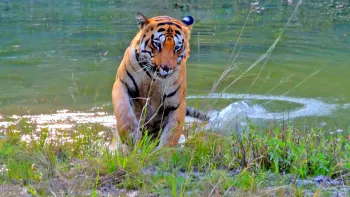Dampa Tiger Reserve Travel Guide
Dampa Tiger Reserve, located in the state of Mizoram, India, is a biodiverse hotspot known for its rich flora and fauna. Established in 1985, this sanctuary is a haven for various endangered species, including the majestic Bengal tigers. The reserve's lush forests, pristine rivers, and rolling hills make it a paradise for nature enthusiasts and wildlife lovers. Dampa Tiger Reserve is not just a conservation area but also a significant cultural landmark, with many indigenous tribes calling it home for centuries.Top Attractions in Dampa Tiger Reserve
- Spotting Bengal Tigers in their natural habitat
- Exploring the diverse flora and fauna on jungle safaris
- Bird watching at the various birding hotspots
- Hiking through the scenic trails and enjoying the breathtaking views
Dampa Tiger Reserve is Famous for
Bengal Tigers and diverse wildlife.Top Attractions in Dampa Tiger Reserve
- Spotting Bengal Tigers in their natural habitat
- Exploring the diverse flora and fauna on jungle safaris
- Bird watching at the various birding hotspots
- Hiking through the scenic trails and enjoying the breathtaking views
What's Great about Travelling to Dampa Tiger Reserve?
- Perfect destination for wildlife enthusiasts
- Offers a unique and off-the-beaten-path experience
- Great opportunity for nature photography
What's Not So Great about Travelling to Dampa Tiger Reserve?
- Limited accommodation options
- Remote location may require extra travel time
- Weather conditions can be unpredictable
Travel Tips for Dampa Tiger Reserve
- Obtain necessary permits and permissions in advance
- Wear comfortable clothing and sturdy shoes for jungle activities
- Respect the local wildlife and follow the rules of the sanctuary
Important Dampa Tiger Reserve trip information
- Ideal Duration: 2-3 days to explore the reserve fully
- Best Time to Visit: October to April for pleasant weather
- Nearby Airports and Railway Stations: The nearest airport is in Aizawl, and the nearest railway station is in Silchar.
Per Person
15,000
*EXCLUDING APPLICABLE TAXES Per Person
17,800
*EXCLUDING APPLICABLE TAXES Per Person
21,000
*EXCLUDING APPLICABLE TAXES Per Person
13,000
*EXCLUDING APPLICABLE TAXES FAQ's on Dampa Tiger Reserve
Q1: What is the best time to visit Dampa Tiger Reserve?
The best time to visit Dampa Tiger Reserve is during the winter months from November to February when the weather is pleasant and ideal for wildlife sightings. Avoid the monsoon season from June to September as heavy rainfall can make the terrain challenging to navigate. Consider visiting during March to May for bird watching opportunities and lush greenery. Keep an eye out for any special events or festivals that may enhance your experience.
Q2: Do I need a visa to travel to Dampa Tiger Reserve?
Most visitors to Dampa Tiger Reserve will require a tourist visa to enter the country. Make sure to check the specific visa requirements based on your nationality before planning your trip. Some countries may be eligible for visa on arrival or e-visa options. Ensure your passport has sufficient validity and blank pages for stamping.
Q3: What are the must-visit attractions in Dampa Tiger Reserve?
Dampa Tiger Reserve is known for its rich biodiversity and stunning landscapes. Don't miss exploring the lush forests on guided wildlife safaris to spot tigers, leopards, elephants, and a variety of bird species. Visit the tribal villages nearby to experience the local culture and traditional way of life. Trekking to scenic viewpoints and camping under the stars are also popular activities.
Q4: Is Dampa Tiger Reserve a safe place to travel?
Dampa Tiger Reserve is generally safe for tourists, but it's important to follow safety guidelines provided by park authorities. Be cautious while trekking or on safaris, especially in wildlife zones. Avoid straying off designated paths and respect the natural habitat. Stay updated on weather conditions and any alerts issued by the park authorities.
Q5: What is the local currency in Dampa Tiger Reserve and can I use credit cards?
The local currency in Dampa Tiger Reserve is likely to be the national currency of the country where the reserve is located. While credit cards may be accepted at some hotels or tourist spots, it's advisable to carry cash for transactions in local markets or rural areas. ATMs may not be readily available, so plan accordingly.
Q6: What is the local cuisine like in Dampa Tiger Reserve?
The local cuisine in Dampa Tiger Reserve is likely to reflect the culinary traditions of the region where it is situated. Enjoy traditional dishes made with locally sourced ingredients, such as flavorful curries, rice dishes, and grilled meats. Vegetarian options are also commonly available. Be open to trying new flavors and spice levels, but ensure you are aware of any dietary restrictions.
Q7: What transportation options are available in Dampa Tiger Reserve?
Transportation options in Dampa Tiger Reserve may include guided safaris, private tours, or rental vehicles for exploring the area. Public transport within the reserve may be limited, so consider hiring a local guide or driver for convenience. Taxis or car rentals may be available from nearby towns. Plan your transportation in advance to make the most of your visit.
Q8: Are there any cultural norms or etiquette I should be aware of when visiting Dampa Tiger Reserve?
Respect local customs and traditions when visiting Dampa Tiger Reserve. Dress modestly, especially when visiting religious sites or interacting with tribal communities. Seek permission before taking photographs of locals or their property. Be mindful of the environment and wildlife, avoiding littering or disturbing the natural habitat. Learn a few basic phrases in the local language to show respect for the culture.
Q9: I am a travel agent. How can I buy travel leads of Dampa Tiger Reserve?
Register yourself as a travel agent at agents.tripclap.com and then you can buy travel leads to Dampa Tiger Reserve once your account is approved. For more details contact our support team at +91-8069186564 or support@tripclap.com



